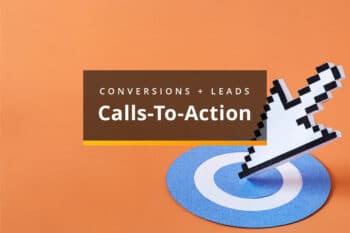1 – Not Having One
I’m not (just) talking about the absence of any internet marketing activity here. Worse still, I’m talking about the lack of any substantive plan to get you from HERE…to….THERE.
‘Why?’ is my business partner Chris’ favorite question. (It can be really annoying). If one of our graphic designers presents a design iteration and isn’t able to explain why a particular element on the screen is in a certain location, or a copywriter can’t justify their selection for the ‘Title’ in a client’s landing page? Well mister, sit back and enjoy the fireworks. Someone’s going to get the business…but good.
And you know what? He’s 110% right. Acting without understanding your outcome will only lead to disappointment & failure. By asking ‘why’, we challenge our assumptions and are forced to dig deep and really assess the motives, the methods, and opportunities before us.
Rather than REacting to a series of disconnected inputs that can send us hither and fro, successful internet marketing strategies allow us to apply our best effort with our best resources towards those activities that are most likely to lead to a successful result.
2 – Confusing Tactics With Strategy
Yes, having a blog, tweetering and myfacing may be cornerstones of your online marketing strategy. But they’re just a few pieces to the puzzle. A series of disassociated activities will not yield you the results you hope for.
You need an internet marketing strategy that encompasses the entirety of your company’s online presence. There a many, many tactics and media channels to consider when formulating your plan of attack. Don’t limit yourself until you’re confident you’ve chosen those channels and those activities which will yield the best results.
3 – Confusing Objectives with Strategy
I have to thank John Jantsch of Duct Tape Marketing for this insight (seriously, John, just a big fan). Saying that your strategy is to grow your business by getting 50 new leads a month off your website, is not an online marketing strategy. It’s an objective. It’s a target.
Don’t get me wrong. The process of setting the right target is key to the success of any marketing strategy.
But HOW are you going to get those new leads again? Explain it to me like I’m a three-year-old. Better yet, draw me a picture. I like pictures.
4 – Not Knowing Who Your Ideal Customer Is
How can we focus a sales message when we don’t know who we’re selling to? Who are your most profitable customers? What are their concerns and interests, and what are their fears? How can your services help them address their concerns?
We want to attract the most profitable customers right? And that’s not necessarily those who are willing to pay the most for your services.
Who’s my ideal customer?
In our business, our best customers are the ones who don’t need to be sold on the concept of online marketing. They’ve already invested in the idea and the importance of this aspect of their marketing and are looking for someone they can trust, who knows what they’re talking about, meets stated goals and objectives, and executes on time and on budget.
So when we run into someone who isn’t so sure if this ‘internet thing’ is really gonna pan out in the end and wants someone to convince them? Well, it was very nice to meet you, but I’m not sure we’re the best to meet your needs.
To take this further, I like to use real-life examples when working on our marketing activities. When I write, I’m not writing to a broad audience. I’m actually writing an email to “Carl,” one of my best customers.
The reason for all this? It helps refine the messaging in all aspects of your marketing. The audience you attract on the internet may differ slightly from your traditional audience. It’s important to articulate who you work for and why they chose you. You can better position yourself to those people in the offers you present (Buy 1 get 1 free vs. Premium Pricing), the media channels you communicate through (Facebook vs. LinkedIn), and the tone and presentation of the conversation you and your employees engage with them on.
5 – Seeing Sales as a Funnel
I’ve always been an ‘old school’ marketing guy. Yes, the media may change but the basic tenants and discipline of the marketing profession, both online and off, have not changed. It’s not a new economy. But the rules Dale Carnegie and others established long ago still hold true.
That said, I’m officially changing my position on the idea of a sales funnel. I’m not saying the dynamic of customer behavior has changed. I’m saying, perhaps it never was a sales funnel.
Dave Edelman of McKinsey & Partners wrote a great article: The Funnel is Dead. The New Consumer Decision Journey. I believe this concept is more reflective of the world we really live in.
That said, there’s still a connection and a persistent thread of communication and interaction that’s going on between you, the customer, and all the media channels they interact with. Assuming a customer who was introduced to your product via a Google search will immediately click-to-buy, is not realistic. It may take 3, 5, or 25 touches before someone decides to become a customer. The challenge is nurturing that relationship over time so that you get them to trust, like, and buy from you.
6 – Believing the ‘Goal’ is to Generate Traffic to Your Website
We’ve said it before. Online marketing is not about generating website traffic. Internet marketing is about growing your business. My hope is that this is old news and that you’ve already moved on to the next bullet point below. However, if you’re still reading this part, the concept of CONVERSION is something you should learn to embrace.
What if you could double the sales of your online store with the same volume of traffic you receive now? Would you rather get 10,000 visitors in one month and 10 sales or 1000 visitors and 100 sales? By attracting the right visitor with the right messaging, a great offer, and delivering a landing page that delivers the exact information they need to get them to commit to break down and buy (already).
7 – Not Knowing How You Will Measure Success
I once had a boss who lived by the motto: If you can’t measure it. You can’t manage it. It may not be a funnel, but you can still measure customer engagement.
Conversion is a key measure. But ‘how’ do YOU measure conversion? It may be a sale, it may be signing up for your email newsletter, it may be someone ‘Liking’ your company’s Facebook page. But technically speaking how will you know this? Do you have the tools, the scheduled time, and the resources lined up to report how you’re doing?
My point: it’s important to identify WHAT and HOW and WHEN you will measure your marketing activities. Before you launch any such campaign, you should have agreed, as an organization, on those measures. Then at predetermined times you can stop, take a breath, review your progress, and make adjustments. Perhaps these measures are visits to a key page, and sign-ups to a newsletter that lead them to receive a weekly email with coupons, that lead them to buy at your local retail outlet.
8 – Failure to Create a Testing Model
Speaking of measures… It’s just as important to have a system that allows you to test key assumptions before rolling out a huge investment in a major online marketing campaign.
I suspect traditional marketers initially shied away from internet marketing for fear that it was an all-or-nothing proposition. In reality, any marketing that doesn’t incorporate a blueprint for testing the variables which will make or break your marketing campaign risks wasting time, money, and resources.
By testing hypotheses related to response rates, click-through, conversion, pay-up, and retention across your segmented media channels you can ensure you have a business model which is based on real honest-to-gosh data. Then, and only then, you can make a sound business decision whether or not to scale these activities up by throwing more money at them.
9 – Not Aligning Your Online and Offline Marketing Strategies
If your online marketing strategy is managed by ‘Billy the Intern’ because he’s young and he ‘gets it’. Stop. Please stop right now and reconsider. As smart as Billy may be, we can no longer shirk our responsibility as marketers to fully understand and embrace the Internet as a key sales channel.
Too often our online activities fail to reflect what’s really going on with our offline marketing efforts. Yes, include your URL in your radio commercial and on your coupon fliers. But have you truly INTEGRATED these channels together? Will people visiting from the radio commercial be presented with relevant information and calls to action that speak to their needs? Or will it just be a brochure selling every single product you’ve ever created?
Like it or not, your entire Internet presence, above and beyond your website, needs to be integrated and aligned with your traditional marketing efforts.
10 – Not Considering All the Media Channels at Your Disposal
We live in a multiscreen, multichannel world. It’s not about your website. It’s about your entire internet presence. What are all the communication mediums available for you to interact with potential customers?
Yes, Facebook, LinkedIn, and Twitter channels to consider. But are there niche sites related to your industry that you should advertise on? Where does PPC fit in? What about retargeting? DRIP email marketing campaigns? Google Shopping Cart? Amazon?
Are there ‘ride-alongs’ you can advertise in industry newsletters? Can you sponsor an e-book on a major thought-leading website? Is Yelp! a viable channel for you to consider?
The point is: don’t limit yourself to thinking it’s all about your website. The ecosystem of online marketing is bigger than that…much bigger than that.
11 – Not Having Consensus
Marketing is not a monologue. It’s a conversation.
We can’t all agree on everything. I don’t recommend ‘marketing planning by committee.’ But you should work to engage your team and your customers in the early development of your online marketing strategy.
Practically speaking, you won’t be able to get everyone to agree on every aspect of what you’re planning to do. Everyone will have their own opinions. BUT, it is important that they can consent to GET BEHIND the final plan. And that they will commit, as a team, to do everything in their power to make it a success.
Marketers, customer service, sales, and production…. should all have a voice in the development of your Internet marketing strategy. Yes, you’ll make the final decision. But by involving a broader audience, you can ensure you aren’t creating a myopic strategy that does not resonate with your team OR your customers.
If you can get your team to embrace the strategy and get their backs behind it, your chances for success increase a hundredfold.
12 – Second Guessing Your strategy once it’s in motion
The time for analysis, questioning, and thoughtful repose has ended. Time to get to work.
In the early weeks of execution, you’ll be tempted to stop, start, stop-start. But trust the plan you’ve developed.
Don’t second guess yourself. Not now. The time for measurement and course correction will come at the pre-determined intervals you’ve already established (see mistake # 7). But you should COMMIT all your energy and resources to give the current plan its best chance for success. Don’t let the distraction of early success & failures guide you off course.
Most Popular Articles

Seeing Favicons in Your Google Search Results? Here’s Why…
Have you noticed anything different in your Google Search results lately? Google added tiny favicon icons to its organic search results in January. It was…

Business Growth and Digital Marketing News & Tips 4-14-24
Did you know? It’s five to twenty-five times more expensive to acquire a new customer than to retain an existing one. Increasing customer retention by…

Business Growth and Digital Marketing News & Tips 3-28-24
With the desire for precise measurement tools to determine ROI, there has been a rise in attention metrics. These metrics, which often utilize eye-tracking data,…








